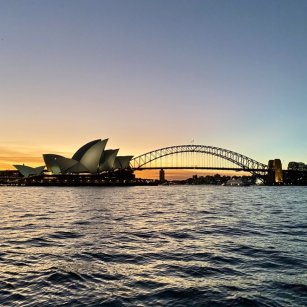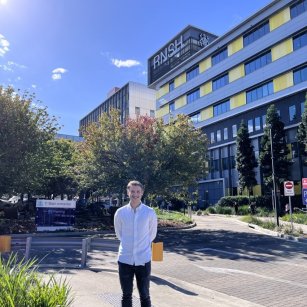Royal North Shore Hospital
From February to April, I was fortunate enough to visit the Royal North Shore Hospital (RNSH). Their endocrine surgical unit, led by prof. Mark Sywak and prof. Stan Sidhu, is internationally renowned, and known for its strong focus on research and innovation in endocrine surgery. At RNSH, I explored possible solutions for predicting bilateral disease in patients with low-risk PTC. This is important because conservative surgery leaves half of the thyroid intact, and recent studies, including my own, have shown that bilateral disease is an independent risk factor for recurrent thyroid cancer.
Australian lifestyle
Sydney’s culture, with its laid-back lifestyle and strong affinity for outdoor activities and sports, is remarkably healthy and vibrant. Early morning exercise is a common routine, and I joined many locals for workouts and ocean swims at the famous Bondi Beach before heading to the hospital. Subsequently, my daily commute included a metro ride over the Harbour bridge, with a stunning view of the Opera House, and I started my workday at 8.30 AM.

Work-life and study outcomes
The first month at RNSH was challenging, trying to get all ethical paperwork necessary for my research. However, people at the department were very helpful and made me feel at home quickly. Australians are similar to Dutch people in their directness and sense of humor, which made it easier to adapt. My primary work involved merging various databases from different departments and private clinics – a significant difference from the Netherlands – into one comprehensive database. With the assistance of prof. Anthony Gill, I gained access to the pathology database, enabling a broader search for histopathological features as predictors of bilateral disease post-hemithyroidectomy.
Ultimately, I was able to merge data of 737 patients with low-risk PTC. Our findings highlight that a larger tumor size, tumor-venous invasion, and ipsilateral multifocal disease, are significantly associated with bilateral disease. Also, pre-operative ultrasounds were found to be highly predictive of significant contralateral thyroid lobe cancer. We also compared Australian and Dutch populations in this retrospective study, with the goal to subsequently implement our findings to patients in the Netherlands.
I would like to extend my gratitude to everyone who made this project possible, especially the Cancer Center Amsterdam for their travel grant. This experience has been invaluable for my academic and professional growth.
Pedro Rodriguez Schaap, MD / PhD Candidate
Department of endocrine Surgery Amsterdam UMC

This article was written for Cancer Center Amsterdam.

